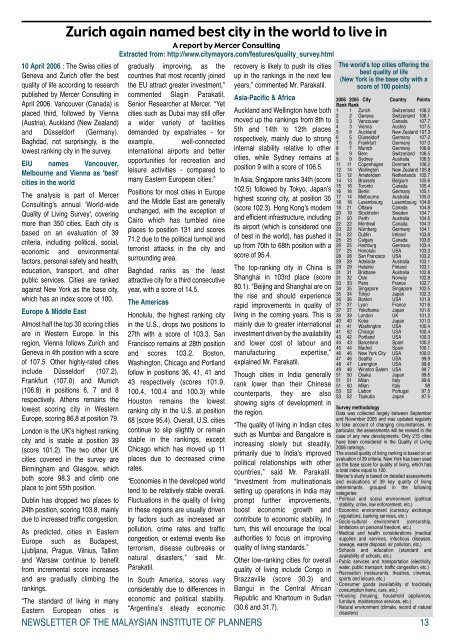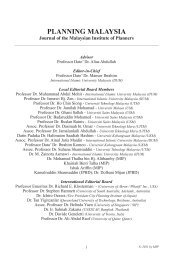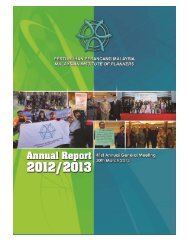Download July 2006 Issue - Malaysian Institute of Planners
Download July 2006 Issue - Malaysian Institute of Planners
Download July 2006 Issue - Malaysian Institute of Planners
Create successful ePaper yourself
Turn your PDF publications into a flip-book with our unique Google optimized e-Paper software.
10 April <strong>2006</strong> : The Swiss cities <strong>of</strong><br />
Geneva and Zurich <strong>of</strong>fer the best<br />
quality <strong>of</strong> life according to research<br />
published by Mercer Consulting in<br />
April <strong>2006</strong>. Vancouver (Canada) is<br />
placed third, followed by Vienna<br />
(Austria), Auckland (New Zealand)<br />
and Düsseldorf (Germany).<br />
Baghdad, not surprisingly, is the<br />
lowest ranking city in the survey.<br />
EIU names Vancouver,<br />
Melbourne and Vienna as 'best'<br />
cities in the world<br />
The analysis is part <strong>of</strong> Mercer<br />
Consulting's annual 'World-wide<br />
Quality <strong>of</strong> Living Survey', covering<br />
more than 350 cities. Each city is<br />
based on an evaluation <strong>of</strong> 39<br />
criteria, including political, social,<br />
economic and environmental<br />
factors, personal safety and health,<br />
education, transport, and other<br />
public services. Cities are ranked<br />
against New York as the base city,<br />
which has an index score <strong>of</strong> 100.<br />
Europe & Middle East<br />
Zurich again named best city in the world to live in<br />
A report by Mercer Consulting<br />
Extracted from: http://www.citymayors.com/features/quality_survey.html<br />
Almost half the top 30 scoring cities<br />
are in Western Europe. In this<br />
region, Vienna follows Zurich and<br />
Geneva in 4th position with a score<br />
<strong>of</strong> 107.5. Other highly-rated cities<br />
include Düsseldorf (107.2),<br />
Frankfurt (107.0) and Munich<br />
(106.8) in positions 6, 7 and 8<br />
respectively. Athens remains the<br />
lowest scoring city in Western<br />
Europe, scoring 86.8 at position 79.<br />
London is the UK’s highest ranking<br />
city and is stable at position 39<br />
(score 101.2). The two other UK<br />
cities covered in the survey are<br />
Birmingham and Glasgow, which<br />
both score 98.3 and climb one<br />
place to joint 55th position.<br />
Dublin has dropped two places to<br />
24th position, scoring 103.8, mainly<br />
due to increased traffic congestion.<br />
As predicted, cities in Eastern<br />
Europe such as Budapest,<br />
Ljubljana, Prague, Vilnius, Tallinn<br />
and Warsaw continue to benefit<br />
from incremental score increases<br />
and are gradually climbing the<br />
rankings.<br />
“The standard <strong>of</strong> living in many<br />
Eastern European cities is<br />
gradually improving, as the<br />
countries that most recently joined<br />
the EU attract greater investment,”<br />
commented Slagin Parakatil,<br />
Senior Researcher at Mercer. “Yet<br />
cities such as Dubai may still <strong>of</strong>fer<br />
a wider variety <strong>of</strong> facilities<br />
demanded by expatriates - for<br />
example, well-connected<br />
international airports and better<br />
opportunities for recreation and<br />
leisure activities - compared to<br />
many Eastern European cities.”<br />
Positions for most cities in Europe<br />
and the Middle East are generally<br />
unchanged, with the exception <strong>of</strong><br />
Cairo which has tumbled nine<br />
places to position 131 and scores<br />
71.2 due to the political turmoil and<br />
terrorist attacks in the city and<br />
surrounding area.<br />
Baghdad ranks as the least<br />
attractive city for a third consecutive<br />
year, with a score <strong>of</strong> 14.5.<br />
The Americas<br />
Honolulu, the highest ranking city<br />
in the U.S., drops two positions to<br />
27th with a score <strong>of</strong> 103.3. San<br />
Francisco remains at 28th position<br />
and scores 103.2. Boston,<br />
Washington, Chicago and Portland<br />
follow in positions 36, 41, 41 and<br />
43 respectively (scores 101.9,<br />
100.4, 100.4 and 100.3) while<br />
Houston remains the lowest<br />
ranking city in the U.S. at position<br />
68 (score 95.4). Overall, U.S. cities<br />
continue to slip slightly or remain<br />
stable in the rankings, except<br />
Chicago which has moved up 11<br />
places due to decreased crime<br />
rates.<br />
“Economies in the developed world<br />
tend to be relatively stable overall.<br />
Fluctuations in the quality <strong>of</strong> living<br />
in these regions are usually driven<br />
by factors such as increased air<br />
pollution, crime rates and traffic<br />
congestion, or external events like<br />
terrorism, disease outbreaks or<br />
natural disasters,” said Mr.<br />
Parakatil.<br />
In South America, scores vary<br />
considerably due to differences in<br />
economic and political stability.<br />
“Argentina’s steady economic<br />
recovery is likely to push its cities<br />
up in the rankings in the next few<br />
years,” commented Mr. Parakatil.<br />
Asia-Pacific & Africa<br />
Auckland and Wellington have both<br />
moved up the rankings from 8th to<br />
5th and 14th to 12th places<br />
respectively, mainly due to strong<br />
internal stability relative to other<br />
cities, while Sydney remains at<br />
position 9 with a score <strong>of</strong> 106.5.<br />
In Asia, Singapore ranks 34th (score<br />
102.5) followed by Tokyo, Japan’s<br />
highest scoring city, at position 35<br />
(score 102.3). Hong Kong’s modern<br />
and efficient infrastructure, including<br />
its airport (which is considered one<br />
<strong>of</strong> best in the world), has pushed it<br />
up from 70th to 68th position with a<br />
score <strong>of</strong> 95.4.<br />
The top-ranking city in China is<br />
Shanghai in 103rd place (score<br />
80.1). “Beijing and Shanghai are on<br />
the rise and should experience<br />
rapid improvements in quality <strong>of</strong><br />
living in the coming years. This is<br />
mainly due to greater international<br />
investment driven by the availability<br />
and lower cost <strong>of</strong> labour and<br />
manufacturing expertise,”<br />
explained Mr. Parakatil.<br />
Though cities in India generally<br />
rank lower than their Chinese<br />
counterparts, they are also<br />
showing signs <strong>of</strong> development in<br />
the region.<br />
“The quality <strong>of</strong> living in Indian cites<br />
such as Mumbai and Bangalore is<br />
increasing slowly but steadily,<br />
primarily due to India’s improved<br />
political relationships with other<br />
countries,” said Mr. Parakatil.<br />
“Investment from multinationals<br />
setting up operations in India may<br />
prompt further improvements,<br />
boost economic growth and<br />
contribute to economic stability. In<br />
turn, this will encourage the local<br />
authorities to focus on improving<br />
quality <strong>of</strong> living standards.”<br />
Other low-ranking cities for overall<br />
quality <strong>of</strong> living include Congo in<br />
Brazzaville (score 30.3) and<br />
Bangui in the Central African<br />
Republic and Khartoum in Sudan<br />
(30.6 and 31.7).<br />
The world's top cities <strong>of</strong>fering the<br />
best quality <strong>of</strong> life<br />
(New York is the base city with a<br />
score <strong>of</strong> 100 points)<br />
<strong>2006</strong> 2005 City Country Points<br />
Rank Rank<br />
1 1 Zurich Switzerland 108.2<br />
2 2 Geneva Switzerland 108.1<br />
3 3 Vancouver Canada 107.7<br />
4 3 Vienna Austria 107.5<br />
5 8 Auckland New Zealand 107.3<br />
6 5 Düsseldorf Germany 107.2<br />
7 6 Frankfurt Germany 107.0<br />
8 7 Munich Germany 106.8<br />
9 9 Bern Switzerland 106.5<br />
9 9 Sydney Australia 106.5<br />
11 11 Copenhagen Denmark 106.2<br />
12 14 Wellington New Zealand 105.8<br />
13 12 Amsterdam Netherlands 105.7<br />
14 13 Brussels Belgium 105.6<br />
15 16 Toronto Canada 105.4<br />
16 16 Berlin Germany 105.1<br />
17 14 Melbourne Australia 105.0<br />
18 18 Luxembourg Luxembourg 104.8<br />
18 21 Ottawa Canada 104.8<br />
20 19 Stockholm Sweden 104.7<br />
21 20 Perth Australia 104.5<br />
22 22 Montreal Canada 104.3<br />
23 22 Nürnberg Germany 104.1<br />
24 22 Dublin Ireland 103.8<br />
25 25 Calgary Canada 103.6<br />
26 25 Hamburg Germany 103.4<br />
27 25 Honolulu USA 103.3<br />
28 28 San Francisco USA 103.2<br />
29 29 Adelaide Australia 103.1<br />
29 29 Helsinki Finland 103.1<br />
31 31 Brisbane Australia 102.8<br />
31 32 Oslo Norway 102.8<br />
33 33 Paris France 102.7<br />
34 35 Singapore Singapore 102.5<br />
35 34 Tokyo Japan 102.3<br />
36 36 Boston USA 101.9<br />
37 37 Lyon France 101.6<br />
37 37 Yokohama Japan 101.6<br />
39 39 London UK 101.2<br />
40 40 Kobe Japan 101.0<br />
41 41 Washington USA 100.4<br />
41 52 Chicago USA 100.4<br />
43 42 Portland USA 100.3<br />
44 43 Barcelona Spain 100.2<br />
45 44 Madrid Spain 100.1<br />
46 46 New York City USA 100.0<br />
47 46 Seattle USA 99.9<br />
48 47 Lexington USA 99.8<br />
49 48 Winston Salem USA 99.7<br />
51 50 Osaka Japan 99.6<br />
51 51 Milan Italy 99.6<br />
51 50 Milan Italy 98<br />
53 52 Lisbon Portugal 97.5<br />
53 52 Tsukuba Japan 97.5<br />
Survey methodology<br />
Data was collected largely between September<br />
and November 2005 and was updated regularly<br />
to take account <strong>of</strong> changing circumstances. In<br />
particular, the assessments will be revised in the<br />
case <strong>of</strong> any new developments. Only 215 cities<br />
have been considered in the Quality <strong>of</strong> Living<br />
<strong>2006</strong> rankings.<br />
The overall quality <strong>of</strong> living ranking is based on an<br />
evaluation <strong>of</strong> 39 criteria. New York has been used<br />
as the base score for quality <strong>of</strong> living, which has<br />
a total index equal to 100.<br />
Mercer’s study is based on detailed assessments<br />
and evaluations <strong>of</strong> 39 key quality <strong>of</strong> living<br />
determinants, grouped in the following<br />
categories:<br />
• Political and social environment (political<br />
stability, crime, law enforcement, etc.)<br />
• Economic environment (currency exchange<br />
regulations, banking services, etc.)<br />
• Socio-cultural environment (censorship,<br />
limitations on personal freedom, etc.)<br />
• Medical and health considerations (medical<br />
supplies and services, infectious diseases,<br />
sewage, waste disposal, air pollution, etc.)<br />
• Schools and education (standard and<br />
availability <strong>of</strong> schools, etc.)<br />
• Public services and transportation (electricity,<br />
water, public transport, traffic congestion, etc.)<br />
• Recreation (restaurants, theatres, cinemas,<br />
sports and leisure, etc.)<br />
• Consumer goods (availability <strong>of</strong> food/daily<br />
consumption items, cars, etc.)<br />
• Housing (housing, household appliances,<br />
furniture, maintenance services, etc.)<br />
• Natural environment (climate, record <strong>of</strong> natural<br />
disasters)<br />
NEWSLETTER OF THE MALAYSIAN INSTITUTE OF PLANNERS 13












